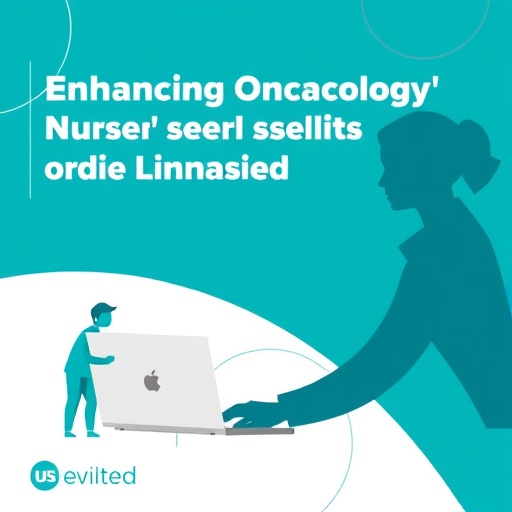In a groundbreaking study published in BMC Medical Education, researchers Yue, Wu, and Zhong, along with their team, introduce a transformative approach to skill training for oncology specialist nurses. The study centers on the synthesis of productive failure theory with the debriefing teaching model, specifically within the context of peripherally inserted central catheter (PICC) skill training. This study marks a significant advancement in nursing education, focusing on enhancing the competencies necessary for effective patient care.
The aspiration of this research is to address the escalating demands in the medical field where oncology nurses are often confronted with intricate clinical procedures. Among these procedures, the insertion of PICC lines has emerged as a critical skill that nurses must master. However, traditional training methods have frequently fallen short in preparing nurses for the complexities encountered in real clinical settings. By integrating productive failure theory into the training process, this innovative research aims to reshape how nurses acquire and refine their skills.
Productive failure theory, as expounded in educational psychology, posits that encountering challenges during the learning process can lead to deeper understanding and retention of skills. This theory is predicated on the idea that mistakes and missteps can serve as vital learning opportunities. In this study, the researchers utilized simulated scenarios where nurses would initially struggle with bringing PICC line insertion skills to fruition. They aimed to create an environment where failure was not just expected but embraced as a pathway to enhancement.
The researchers complemented this model with a structured debriefing teaching approach, which is designed to encourage reflection and discussion following the practical exercises. By discussing the challenges faced during the practice, nurses could articulate their thought processes, analyze their errors, and ground their future practice in reflective learning. This debriefing process became a cornerstone of the training, fostering an environment of continuous improvement.
As the study unfolded, it became evident that merging productive failure with debriefing had numerous benefits. Participants reported feeling more confident in their skills after identifying areas of improvement through guided discussion. This confidence was not simply a reflection of successful skill execution, but rather an acknowledgment of their ability to navigate challenges and learn through trial and error. This approach aligns beautifully with contemporary educational principles advocating for learner-centered strategies that emphasize critical thinking and problem-solving.
Apart from boosting confidence, the integration of these methodologies created a solid foundation for understanding the theoretical underpinnings of the skills being taught. Nurses were not only practicing the physical act of catheter insertion; they were also immersing themselves in the rationale governing the procedures. This duality of practical and theoretical comprehension bridged the gap between knowledge and expertise.
Moreover, the study highlights another vital aspect: teamwork in a clinical environment. The debriefing sessions fostered collaborative learning among participants. Nurses shared insights and strategies, learning from one another’s experiences. This camaraderie built a supportive community that extended beyond the classroom. In an increasingly team-oriented healthcare landscape, the ability to operate within a collaborative environment is a non-negotiable skill for nurse practitioners.
In analyzing the results, the researchers found that those who participated in the combination of productive failure and debriefing exhibited significantly improved performance during practical assessments compared to those who trained through more traditional, directive methods. These findings resoundingly echo the assertion that innovative educational strategies can yield tangible enhancements in clinical skills.
A critical implication of the research is its potential to redefine nursing education frameworks globally. Educational institutions are challenged to rethink their curricula to prioritize experiential learning and skill development through theoretical understanding, a move that could revolutionize how nursing competence is cultivated. The successful pilot of this training model in oncology nursing provides a template that could be adapted across various specialties and procedures.
The significance of this research extends beyond skill acquisition—embracing innovative educational models may better prepare nurses to handle the complexities and emotional weight of clinical practice. As oncology settings often encapsulate high-stakes situations, equipping nurses with robust skills and knowledge fosters both patient safety and nurse resilience. This is a critical consideration in an era where burnout rates among healthcare professionals are alarmingly high.
Further exploration and future studies can expand on these findings, examining the long-term impact of the productive failure approach combined with debriefing on nursing practice in diverse contexts. Opportunities abound for researchers to ascertain whether this model can lead to improved patient outcomes and enhanced job satisfaction among nurses, thus reinforcing the delicate balance between quality care and nurse well-being.
The potential for application of this study’s findings is vast, allowing institutions to incorporate these methodologies into training programs for various clinical skills. As the healthcare system continues to evolve, the imperative to optimize educational pathways for nurses becomes even more critical. By embracing these innovative strategies, the nursing profession can enhance its capacity to meet contemporary challenges effectively.
In conclusion, the study by Yue, Wu, Zhong, and their colleagues illustrates that embracing failures in learning environments can lead to astounding successes in skill mastery. The integration of productive failure theory with structured debriefing models marks a significant transition in nursing education, setting the stage for more competent, confident, and resilient healthcare professionals who can respond adeptly to the challenges of modern clinical practice. The potential ripple effects of such educational innovations may well be felt throughout the medical community as nursing education aligns with the realities of today’s healthcare demands.
Subject of Research: Innovative training approaches for oncology specialist nurses using productive failure theory and debriefing teaching models.
Article Title: Application of productive failure theory combined with debriefing teaching model in peripherally inserted central catheter skill training for oncology specialist nurses.
Article References: Yue, Z., Wu, H., Zhong, L. et al. Application of productive failure theory combined with debriefing teaching model in peripherally inserted central catheter skill training for oncology specialist nurses. BMC Med Educ 25, 1326 (2025). https://doi.org/10.1186/s12909-025-07863-8
Image Credits: AI Generated
DOI: 10.1186/s12909-025-07863-8
Keywords: oncology nursing, productive failure theory, debriefing teaching model, PICC skills training, nursing education.




